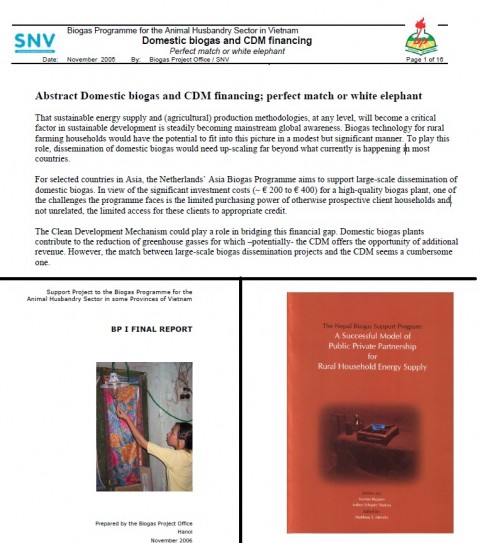In this library entry, there are three documents discussing the impacts of biogas plants in Vietnam and Nepal. Furthermore, financing, implementation, promotion and monitoring of biogas systems are topics of the documents.
++++++++++++++++++++++++
(1)
"Biogas Programme for the Animal Husbandry Sector in Vietnam - Domestic biogas and CDM financing" - Heegde, F., Netherlands Development Organization (2005)
Summary:
For selected countries in Asia, the Netherlands’ Asia Biogas Programme aims to support large-scale dissemination of domestic biogas. In this paper the outline of such a large scale biogas programme (BP II in Vietnam) is discussed in relation with CDM financing. Without claiming to be exhaustive, the paper attempts to explain the “origins” of greenhouse gas reduction by domestic biogas plants and the potential and actual CDM revenue that would result from this. Subsequently, the paper presents the modality to apply this CDM revenue in the biogas programme and its impact on the “finance gap” for the participating households. Finally, the monitoring requirements for the programme, related with the CDM are briefly mentioned.
+++++++++++++++++
(2)
"Support Project to the Biogas Programme for the Animal Husbandry Sector in some Provinces of Vietnam" - Biogas Project Office Hanoi (2006)
Summary:
BP I operated through a comprehensive programme set-up consisting of a
wide range of activities: promotion/marketing, investment subsidy on plants, quality control, research and development, training, extension, monitoring and evaluation, institutional support and management by BPO and PBPOs. The project very effectively provided a flat-rate subsidy of VND 1 million to households that have a biogas plant constructed.
+++++++++++++
(3)
"The Nepal Biogas Support Program: A successful model of public private partnership for rural household energy supply" - Bajgain, S., Shakya, I. (2005)
Summary:
In 1992 the Government of Nepal together with the Netherlands Government engaged support activities to promote the use of biogas in Nepal. The Biogas Support Program (BSP) was initiated by the Netherlands Development Organisation, SNV, with the objective of promoting a wide-scale use of biogas as a sub-stitute for fuelwood, agricultural residues, animal dung and kerosene that are generally used for cooking and lighting in most rural households. In the last decade, the promotion of biogas In Nepal has resulted in significant social and financial benefits. The technical adaptation of biogas systems, designed specifically for Nepalese conditions, has made remarkable progress during the past decade, and the outlook is excellent for continued improvements and expanded use.
Bibliographic information
SNV (2006).
Various documents about the biogas programmes for the animal husbandry sector in Vietnam and for rural households in Nepal Biogas Project Offices, SNV, Netherlands Development Organization
Filter / Tags
Renewable energies and climate change (WG3)Biogas systems RuralEnglish
Downloads
Biogas Programme for the Animal Husbandry Sector in Vietnam - Domestic biogas and CDM financing
Download
Type: application/pdf
Size: 0.29 MB
Support Project to the Biogas Programme for the Animal Husbandry Sector in some Provinces of Vietnam - BP I Final Report
Download
Type: application/pdf
Size: 1.27 MB
The Nepal Biogas Support Program: A Successful Model of Public Private Partnership for Rural Household Energy Supply
Download
Type: application/pdf
Size: 2.33 MB

Published in: 2006
Pages: 0
Publisher:
Biogas Project Offices, SNV, Netherlands Development Organization
Author(s):
SNV
Uploaded by:
Location of library entry:

